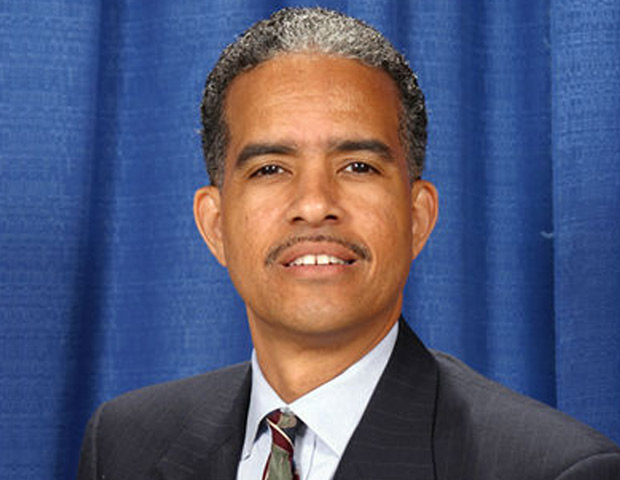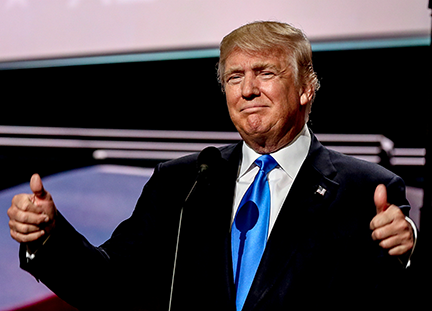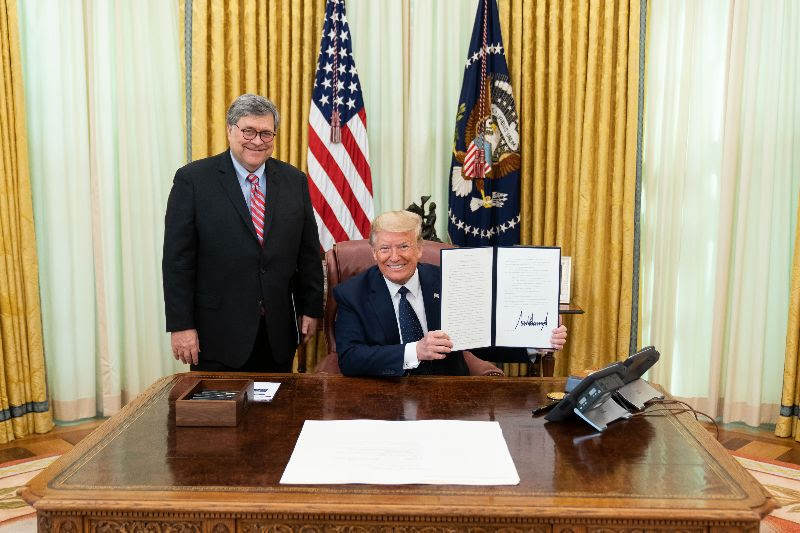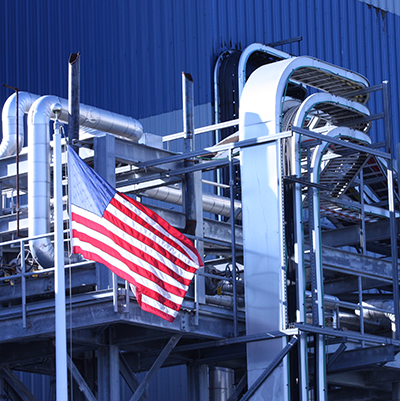The U.S. Economy added 4.8 million jobs in June, which sets the all-time jobs gain record for the second month in a row, according to a report released this morning by the U.S. Department of Labor.
Category: Business & Money
California Governor Gavin Newsom Announces $2.5 Billion Funding for COVID-19 Smackdown of Small Businesses
California Governor Gavin Newsom announced $2.5 billion funding for COVID-19 smackdown of small businesses in his state.
David J. Byrd named National Director of Minority Business Development Agency
WASHINGTON, June 17, 2020 – Today, U.S. Secretary of Commerce Wilbur Ross announced that David J. Byrd will be the new National Director of the U.S. Department of Commerce’s Minority Business Development Agency (MBDA). Mr. Byrd will be the 18th National Director of the agency.
Established by an Executive Order in 1969, MBDA is the only Federal agency solely dedicated to the growth and global competitiveness of U.S. minority-owned businesses.
“David’s vast experience in public service and as an entrepreneur are true assets to MBDA and the Department of Commerce,” said Secretary Ross. “In his new role, I fully expect him to continue to provide the type of leadership that will lay the foundation to usher in the next 50 years of opportunities and growth for minorities as well as the country as a whole.”
Mr. Byrd is originally from New Jersey and has served in many public service roles over the years at the local, state and federal levels. Several years ago, Byrd was named by Black Enterprise Magazine as one of the “10 Black Republicans You Probably Don’t Know but Should.”
Mr. Byrd joined MBDA in October 2019 as the National Deputy Director responsible for overseeing the day-to-day departmental operations and establishing a streamlined information portal to track Agency milestones and program execution. As MBDA National Director, Mr. Byrd will oversee the development and implementation of Agency initiatives, policy agenda, and federal grant programs.
“I am honored to be selected by Secretary Ross to lead the Minority Business Development Agency”, said Mr. Byrd. “I am proud to take the helm as the National Director following several of my career mentors who were instrumental in shaping the mission and strategic direction of MBDA since its founding in 1969. I look forward to continuing the Agency’s work ensuring the resiliency and growth of America’s minority-owned firms today, tomorrow, and for future generations of minority entrepreneurs.”
Prior to accepting the fourth presidential appointment of his career at MBDA, Mr. Byrd served as the Deputy Assistant Secretary, Office of Policy Development, at the U.S. Department of Housing and Urban Development. His more than 28-year career in public service has included executive positions at the county, state, and federal levels. Mr. Byrd is also an experienced entrepreneur who owned and operated a consulting firm specializing in government relations, political consulting, executive and life skills coaching.
By Staff Writers and U.S. Department of Commerce Press Release
Join Bigwigg today. It’s free like the land and brave like our home.
U.S. Economy added 2.5 Million jobs in May
Represents the biggest monthly jobs gain ever recorded
WASHINGTON, DC – The U.S. Economy added 2.5 million jobs in May, which is the biggest gain ever recorded, according to the U.S. Department of Labor. These job gains coincided with the widespread lifting of COVID-19 lockdowns and the limited resumption of economic activity that had been curtailed in March and April. These additional jobs caused a drop in the unemployment rate from 14.7% down to 13.3%.
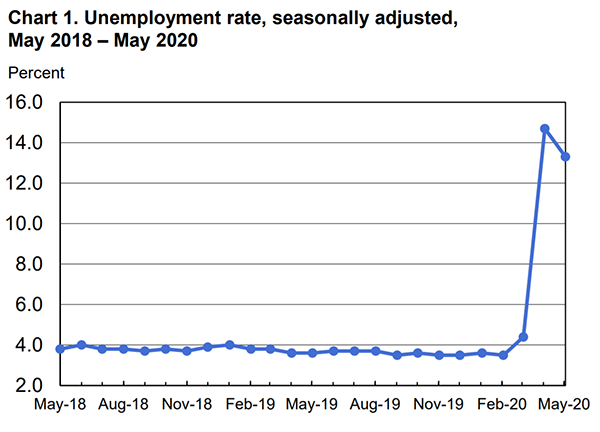
Women benefited more than men in the May jobs recovery, according the report by the Bureau of Labor Statistics (BLS). Unemployment among adult female workers decreased by 13.9%, compared to an 11.6% drop for adult male workers.
The industries that were the big winners in May were:
- Leisure and hospitality (+1,200,000 jobs)
- Construction (+464,000)
- Education and health (+424,000)
- Retail (+368,000)
- Other Services (+272,000)
- Manufacturing (+225,000)
The industries that continued to be challenged in May were:
- Government (-585,000 jobs) – most of those losses consist of public education workers
- Information (–38,000)
- Mining (-20,000)
President Trump reacted very positively to the news, as expected. “We’re bringing our jobs back,” said Trump at a White House press conference this morning. “We’ll go back to having the greatest economy anywhere in the world, nothing close.”
Most economists agree that the economy hit bottom on our about April 15th.
Jason Furman, who is currently an economics professor at Harvard and was previously President Obama’s chief economist has praise for the Trump administration’s initial handling of the COVID-19 economic aftermath, but some reservations about whether Trump will stay the course in providing the required additional stimulus. “One reason for optimism: the fiscal and monetary response to this crisis has been better than any previous crisis,” tweeted Furman. “One reason for pessimism: people who misunderstand the above and want to stop the response when more is needed.”
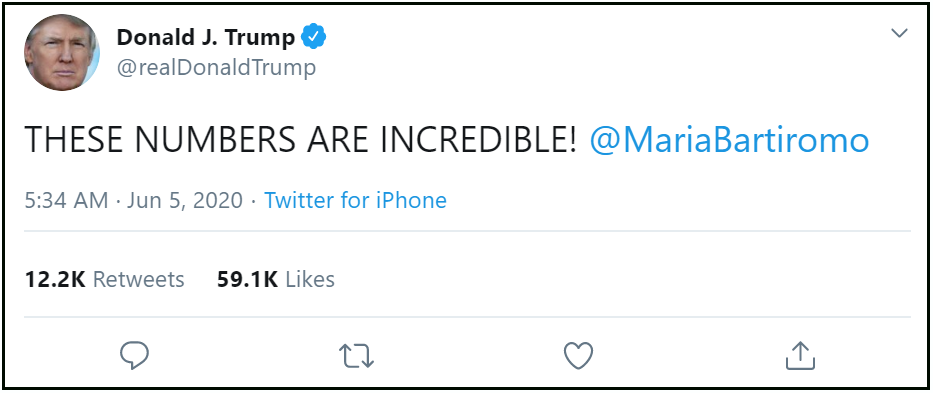
It should be noted that lockdown restrictions have only been partially lifted in most areas, and that the lifting only began in earnest in the middle of May. Thus, June could have much larger job gains. There is still a long way to go before America recovers to the employment levels before COVID-19. February 2020 represented the peak employment, at 158.8 million civilians employed. Due to the shutdown of the economy, the number of civilians employed bottomed out at 133.4 million in April of 2020. With the latest May additions, the current number of employed is 137.2 million.
Even though May’s increase is the largest monthly employment increase ever recorded, we still have a long to go before we get back to the levels before COVID-19. Nevertheless, the fact that the U.S. economy added 2.5 million jobs in May indicates that the economic recovery seems to be off to a good start. This is earlier than most of us had predicted the recovery would begin, so it can only be seen as very good news.
By Craig R. Everett, PhD. Opinions are solely my own. To follow me or add me as a friend on Bigwigg, please visit my Profile Page.
Dr. Everett is a finance professor at the Pepperdine Graziadio Business School, where he teaches entrepreneurial finance and private capital markets.
Trump signs order to fight online censorship
WASHINGTON, DC — May 28, 2020. Earlier today, President Trump signed an Executive Order meant to combat political censorship by social media platforms and other technology giants. The argument by the White House is that since every citizen—liberal, conservative, or otherwise—has a right to be heard, the free exchange of ideas and public debate must be defended.
The following are some key components of the Executive Order on Combating Online Censorship:
- Makes it U.S. policy that platforms who selectively edit, censor, or are not acting in “good faith” with regards to content will not receive the liability protection included in Section 230 of the Communications Decency Act
- Directs the Commerce Department to petition the FCC to make clarifying rules on Section 230 in line with U.S. policy
- Helps stop millions of taxpayer dollars from being wasted by federal agencies on advertising with biased social media platforms
- Ensures the Justice Department will review more than 16,000 complaints about politically motivated censorship that were collected by the White House in advance of a Social Media Summit held last year
- Mobilizes State Attorneys General—who have massive subpoena and consumer protection authorities—to ensure social media platforms are not engaging in unfair or deceptive acts or practices
- Acts as federal law and lists the many ways in which tech platforms act with bias against viewpoints they disagree with
- Massive corporations that treat millions of American citizens unfairly shouldn’t expect special privileges and protections under the law.
“Today, I am signing an Executive Order to protect and uphold the free speech and rights of the American people,” stated President Trump. “Social media companies that engage in censoring or any political conduct will not be able to keep their liability shield – that’s a big deal.”
In response to Trump’s executive order, Speaker of the House Nancy Pelosi (D) stated, “Allowing the spread of disinformation is extremely dangerous. Yet still, the President encourages Facebook & others to continue to exploit and profit off falsehoods – while directing the federal government to dismantle efforts to help users distinguish fact from fiction.”
“If you’re wondering why this is happening now it is NOT just about Trump & Twitter,” tweeted Dr. Kate Klonick, law professor at St. John’s University. “It is almost certainly also about yesterday’s unanimous ruling against government regulating bias in social media from the DC Circuit.” Dr. Klonick has also stated that she believes that this order is not enforceable and will be struck down quickly.
It should be noted that the First Amendment of the U.S. Constitution protects free speech, and was specifically intended to protect political speech as a safeguard against tyranny.
Trump continued, “…virtually any form of communication between private citizens or large public audiences, there is no precedent in American history for so small a number of corporations to control so large a sphere of human interaction.”
The court challenges are expected to begin almost immediately.
By Sarah Jones-Koskinen. Opinions are my own. To follow me or add me as a friend on the Bigwigg Social Network, please visit my Profile Page.
On Bigwigg there is no shadow-banning or ideological censorship. Join Bigwigg today for free. ![]()
Is Free Trade Always a Good Thing?
By Dr. Craig Everett
I am a finance professor and a firm believer in free market capitalism, so my thoughts in this article regarding the drawbacks of free trade may upset some of my academic colleagues. This is because there is a very widely held belief among economists that free trade is always a good thing. My scandalous proposition is that free trade is mostly a good thing.
The standard argument is that any barriers to international trade (like tariffs, for example) create a friction that shrinks economic activity. This is bad. Removing tariffs, on the other hand, lubricates international trade and both economies grow. This is good.
But it’s not quite that simple. What many people don’t realize is that free trade generally benefits smaller countries much more than the big ones. The bigger the difference in size between the two countries, the greater the lopsided benefits to the smaller partner. Therefore, since we are the first or second largest economy in the world (depending on whose numbers you trust), nearly every country gets more benefit from trading with America than America does by trading with them. We do indeed benefit, just less.
Of course, there is nothing wrong with helping smaller countries. We just need to be aware that the smaller country is typically getting the better deal. Foreign aid should be intentional, not accidental or naïve.
One reason why small countries benefit more from trade is because they often have fewer natural resources and thus their need for trade is more urgent. Large countries generally have all the natural resources they need, so international trade is not absolutely necessary for survival. Nearly every raw material we need exists naturally in the United States. There are exceptions, of course, like arsenic, chromium, gallium, manganese, rubidium, tantalum, and tin. There are no active domestic sources for any of those, so international trade is required. No way around it. Diamonds are another example. There are only two diamond mines in the U.S., neither of which is still open for commercial mining.
When economists argue that international trade benefits both countries, they are leaving out a critical piece of information. The overall economies of both countries benefit, but not necessarily all the people. The big loser for the larger country is the middle-class workforce.
“A robust middle-class is the hallmark of a true capitalist economy.”
For example, when companies decide to make their products in low-wage countries, the low-wage country obviously benefits by having more jobs, taxes, etc. In the large country, on the other hand, the management and stockholders benefit from the international trade by earning higher profits. The low-end consumers also benefit from the lower prices on those imported goods.
The group that typically gets hurt the most is the skilled middle-class worker in the larger, richer country. A generation ago, these were the people that used to graduate high school, go to work at the local factory, have a great career, buy a house, buy a boat, take nice vacations, and then enjoy a comfortable retirement. This group is rapidly disappearing because those jobs have been shipped overseas. Soon, most of our economy will consist of highly-paid information workers on the one extreme, and low-paid service workers on the other extreme (with very little in-between). If this is what we want, then it needs to be a deliberate decision, not a surprise when we wake up and realize that we no longer have the ability as a nation to make anything ourselves.
Make no mistake, there are many middle-class business owners and entrepreneurs that benefit from free trade. This should be celebrated. I am specifically speaking about the negative impacts of trade on skilled middle-class workers, particularly workers that are in manufacturing.

A robust middle-class is the hallmark of a true capitalist economy. If the middle-class is struggling, then maybe we don’t have real capitalism anymore. Crony capitalism is actually economic aristocracy, so it doesn’t really count.
There is an obvious national security component to this issue. Is it safe for us to give away our manufacturing base to countries that don’t like us? Even if offshoring these activities makes economic sense right now, what happens when there are geopolitical changes? Many of us were very surprised to find out recently, during the COVID-19 situation, that most of our medications are made in China. This seems like a very risky situation. How much of our population would die if one day prescription drug shipments from China suddenly stopped?
I am a huge fan of free markets, but it really seems like we need to entice more manufacturing back to our own shores, even if it costs a little more. It is a national security issue and a matter of survival. A strong national defense – both military and economic – brings a peace of mind that is not easily measured in dollars.
President Trump appears to have improved the manufacturing situation with his tariffs, deregulation and tax reform. He campaigned in 2016 on the promise of bringing manufacturing jobs back, and to his credit, total manufacturing output in real dollars hit an all-time high in 2019. The number of U.S. manufacturing jobs, which fell by 200,000 during the previous administration, had increased by over 500,000 during the Trump administration before the COVID-19 shutdown happened. This has caused me to reflect on my previous hard-line position about the absolute virtue of free trade in its purest form.
Is free trade always a good thing? Well, it definitely helps both economies on the whole. However, it mainly benefits the rich and the poor, while simultaneously hurting many workers in the middle-class. So the answer is no – free trade is not always a good thing, just mostly.
By Craig Everett. I am a finance professor at the Pepperdine Graziadio Business School and I teach entrepreneurial finance and private capital markets. Opinions are my own. To follow me or add me as a friend on the Bigwigg Social Network, please visit my Profile Page.
On Bigwigg there is no shadow-banning or ideological censorship. Join Bigwigg today for free and invite your patriotic friends. ![]()




